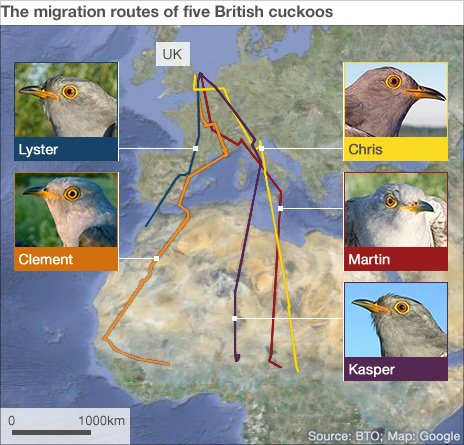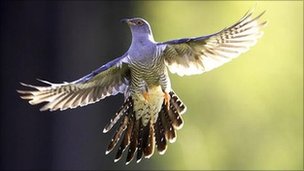Taffycat
Crunchy Cat
- Joined
- Jun 1, 2006
- Messages
- 12,576
- Reaction score
- 1,055
Cuckoos' 5,000km journey tracked by satellite
By Victoria Gill Science reporter, BBC Nature

Continue reading the main story Related Stories
Scientists from the British Trust for Ornithology have tracked the migration routes of five British cuckoos, using tiny satellite-tracking tags.
The team caught and tagged the birds in June and fitted them with trackers, which fitted like miniature backpacks.
All five birds have now reached Africa.
Having started their journeys from the same breeding ground in East Anglia, the birds are now distributed across 3,000km (1,860 miles) of the continent.
Dr Chris Hewson from the BTO explains how the miniature satellite trackers are fitted and how they work
Their tags automatically switch on once every two days for 10 hours. They send off a radio signal revealing their whereabouts, which is picked up by a satellite.
The cuckoo-tracking team, led by the BTO's Chris Hewson, is able to follow the birds from the comfort of the trust's headquarters in Thetford.
"We can log on to their website and download the most recent messages from each of the tags and download that onto a map," Dr Hewson explained to BBC Nature. "So we can get an almost live picture of where the birds are."
Four of the birds have already crossed the Sahara; two are in southern Chad, one is in northern Nigeria and the fourth one is in Burkina Faso. One cuckoo is lagging slightly behind the rest and has made it as far as Morocco.
"He was last seen about 20km outside Casablanca," said Dr Hewson.
Continue reading the main story

"The bird that has travelled furthest, Chris, has already flown almost 5,000km to Chad. We're expecting him to go further than that - possibly as far as 6-7,000km."
Crossing the Sahara is one of the major sources of mortality for many migrants, so the team is relieved that almost all the birds have made it safely across the desert.
The team wants to find out what environments the birds rely on and where they stop off to feed along the way.
"Migratory birds don't just have a breeding area and a wintering area, they also have staging posts where they spend different amounts of time," said Dr Hewson.
"Because Britain and Europe as a whole is getting warmer, they need to get back earlier and earlier to their breeding grounds.
"If we don't know exactly where they are, we won't know where the bottlenecks are that might be preventing the cuckoos from getting back to Brtain.
"So we're particularly interested in where the birds are fattening up before the final journey to Britain."
Migrant decline Cuckoos are one of several migrant species declining in Britain.
According to a 2010 survey by the Royal Society for the Protection of Birds (RSPB), of the 10 UK birds which have declined the most since 1995, eight are summer migrants, including the cuckoo, turtle dove, yellow wagtail and nightingale.
Between 1995 and 2010 the UK lost more than 70% of its turtle doves and nearly half of its cuckoos. The RSPB called the declines "unsustainable".
Martin Davies from the society, who is one of the co-founders of the annual Birdfair, which begins in Rutland Water on Friday said: "We are in danger of losing these sentinels of summer, as the birds' populations have slumped since the mid 1990s.
"The world is changing rapidly and pressures such as habitat destruction, illegal hunting and climate change are believed to be having a major impact on populations of these birds.
"It will be a race against time to tackle these declines."
http://www.bbc.co.uk/nature/14507798
By Victoria Gill Science reporter, BBC Nature

Continue reading the main story Related Stories
- Cuckoos tagged with GPS trackers
- Cuckoos copy hawks to scare birds
- Cuckoo in egg pattern 'arms race'
Scientists from the British Trust for Ornithology have tracked the migration routes of five British cuckoos, using tiny satellite-tracking tags.
The team caught and tagged the birds in June and fitted them with trackers, which fitted like miniature backpacks.
All five birds have now reached Africa.
Having started their journeys from the same breeding ground in East Anglia, the birds are now distributed across 3,000km (1,860 miles) of the continent.
Dr Chris Hewson from the BTO explains how the miniature satellite trackers are fitted and how they work
Their tags automatically switch on once every two days for 10 hours. They send off a radio signal revealing their whereabouts, which is picked up by a satellite.
The cuckoo-tracking team, led by the BTO's Chris Hewson, is able to follow the birds from the comfort of the trust's headquarters in Thetford.
"We can log on to their website and download the most recent messages from each of the tags and download that onto a map," Dr Hewson explained to BBC Nature. "So we can get an almost live picture of where the birds are."
Four of the birds have already crossed the Sahara; two are in southern Chad, one is in northern Nigeria and the fourth one is in Burkina Faso. One cuckoo is lagging slightly behind the rest and has made it as far as Morocco.
"He was last seen about 20km outside Casablanca," said Dr Hewson.
Continue reading the main story

- Cuckoos are brood parasites. In the UK, they lay eggs in the nests of dunnocks, reed warblers and meadow pipits
- One female can lay up to 20 eggs in one breeding season
- The birds look like sparrow hawks and their appearance is thought to intimidate their hosts
- Cuckoos also fool their hosts with egg "mimicry". Their eggs' colour and markings resemble those of their victims
"The bird that has travelled furthest, Chris, has already flown almost 5,000km to Chad. We're expecting him to go further than that - possibly as far as 6-7,000km."
Crossing the Sahara is one of the major sources of mortality for many migrants, so the team is relieved that almost all the birds have made it safely across the desert.
The team wants to find out what environments the birds rely on and where they stop off to feed along the way.
"Migratory birds don't just have a breeding area and a wintering area, they also have staging posts where they spend different amounts of time," said Dr Hewson.
"Because Britain and Europe as a whole is getting warmer, they need to get back earlier and earlier to their breeding grounds.
"If we don't know exactly where they are, we won't know where the bottlenecks are that might be preventing the cuckoos from getting back to Brtain.
"So we're particularly interested in where the birds are fattening up before the final journey to Britain."
Migrant decline Cuckoos are one of several migrant species declining in Britain.
According to a 2010 survey by the Royal Society for the Protection of Birds (RSPB), of the 10 UK birds which have declined the most since 1995, eight are summer migrants, including the cuckoo, turtle dove, yellow wagtail and nightingale.
Between 1995 and 2010 the UK lost more than 70% of its turtle doves and nearly half of its cuckoos. The RSPB called the declines "unsustainable".
Martin Davies from the society, who is one of the co-founders of the annual Birdfair, which begins in Rutland Water on Friday said: "We are in danger of losing these sentinels of summer, as the birds' populations have slumped since the mid 1990s.
"The world is changing rapidly and pressures such as habitat destruction, illegal hunting and climate change are believed to be having a major impact on populations of these birds.
"It will be a race against time to tackle these declines."
http://www.bbc.co.uk/nature/14507798

